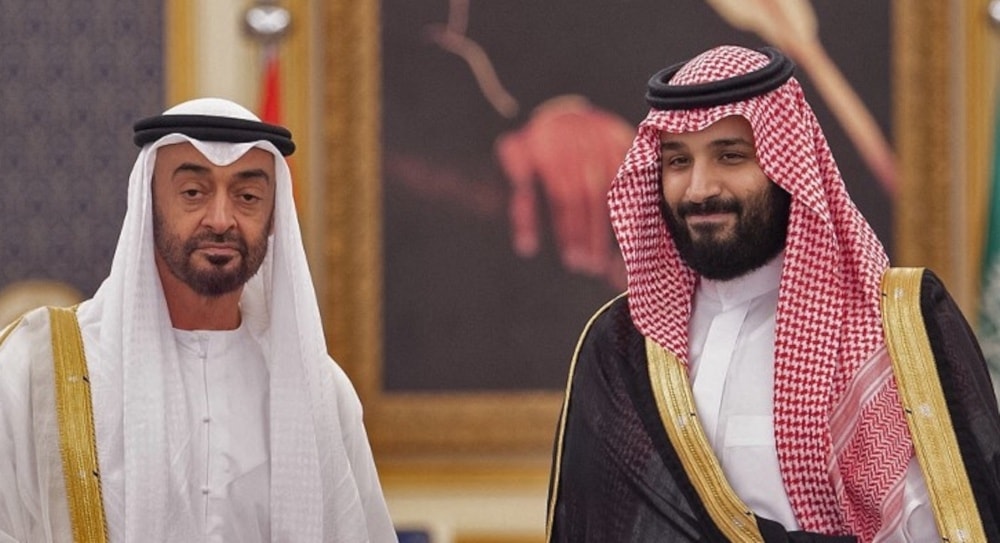US-led anti-Yemen maritime coalition choked by UAE, Saudi divergence
The oil-rich Gulf states have opposing views regarding how to address the Yemeni operations, which are strangling US efforts to establish a military coalition.
-

President of the United Arab Emirates, then-Abu Dhabi Crown Prince Mohammed bin Zayed, with Saudi Crown Prince Mohammed bin Salman in Jeddah, Saudi Arabia, in 2018 (AFP)
US efforts to establish a maritime military coalition to counter the growing escalation by Yemen, which has launched a phase of operations since November in support of Gaza in the face of the Israeli brutal war, is currently being blocked by a core dispute among Washington's Arab allies, Bloomberg reported on Monday, citing sources.
The rivalry between Saudi Arabia and the UAE, which started during their war on Yemen years ago and set a race for dominance and influence in West Asia, has become a major obstacle today in the face of the US plans.
Read more: 'UAE stabbed us in the back': MBS
'Prosperity Guardian' against Gaza
Since Yemen enforced an equation of targeting all Israeli and Israeli-affiliated vessels in the Red Sea, which later expanded the scope to the Arabian Sea and to include any cargo ship heading to the occupation entity regardless of its nationality, several major shipping companies announced redirecting their ships away from the prohibited areas.
The new route would see commercial vessels circling Africa to reach destinations in the Mediterranean, which would increase delivery time and shipping costs. Additionally, the insurance premiums were hiked on all merchandise making its way to the entity due to rising security risks.
Read more: US threatened Sanaa, received ballistic response on 'Israel': Excl.
In a report published on Sunday, War Zone revealed, citing a Pentagon official who requested anonymity, that US Defense Secretary Lloyd Austin, during his upcoming trip to the Middle East this week, is set to unveil an international initiative called "Prosperity Guardian".
According to the website, the purpose of this program is to safeguard ships in the Red Sea from potential operations. The group's activities would include patrolling the Red Sea, Bab al-Mandab Strait, and the Gulf of Aden.
Diplomacy vs war
Today, the main disagreement between the two oil-rich countries is how to respond to the equation imposed by the Yemeni Armed Forces.
Riyadh supports a more balanced approach, fearing severe retaliation from Sanaa, as seen in previous years, particularly with the attacks on Aramco in 2019 - which disrupted half of Saudi Arabia’s oil production after targeting an oil-processing plant. This concern also arises in the context of ongoing peace talks following 8 years of failed aggression against the country.
Furthermore, the Kingdom believes diplomatic discussions with Iran would help solve the matter and avert a military escalation, reflecting a new Saudi policy toward the Islamic Republic following the China-brokered rapprochement deal last March.
Read more: Iran, Saudi call for a ceasefire in Gaza
However, despite Sanaa also proving that it is capable of causing extensive damage to the UAE, evidently from several previous operations, the Gulf state is urging Washington to launch a military attack on Yemen and to redesignate Ansar Allah as a "terrorist organization".
“There’s mounting pressure on Washington to take more robust action, and a pivot is coming,” analysts at Rapidan Energy Group, a Washington-based risk advisory firm, said, commenting on the issue, pointing out that the situation in the Red Sea, added to the Israeli confrontations with Lebanese Resistance Hezbollah, “may prompt markets to start pricing in geopolitical risk.”

 3 Min Read
3 Min Read








